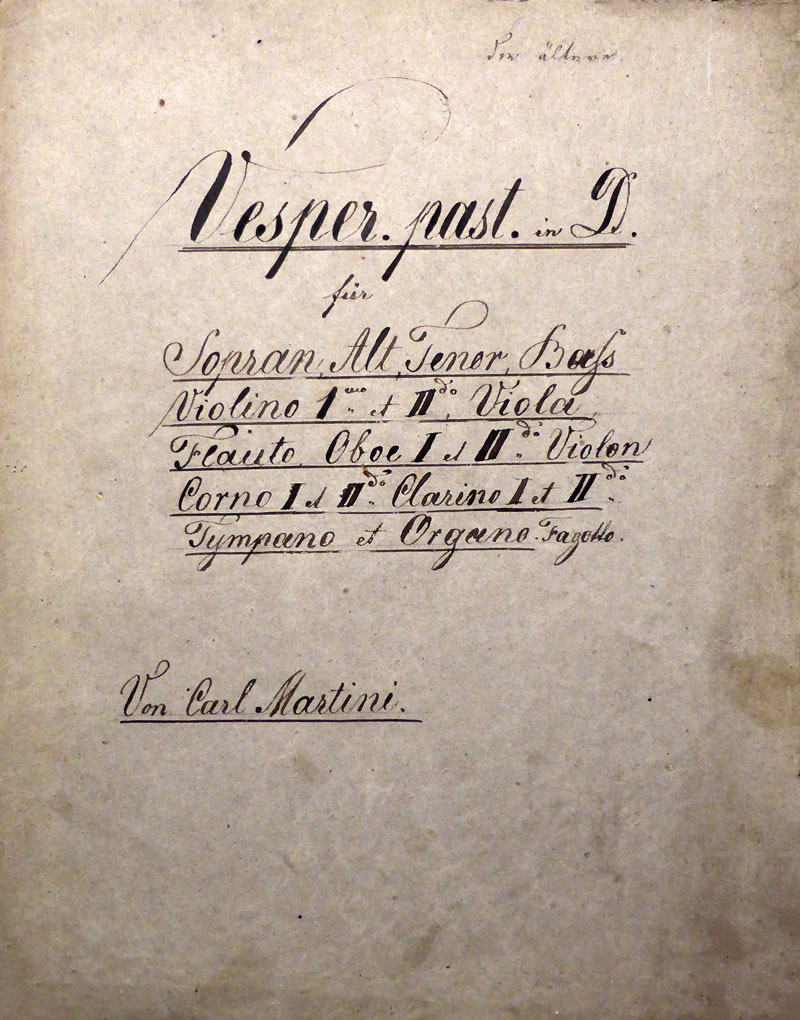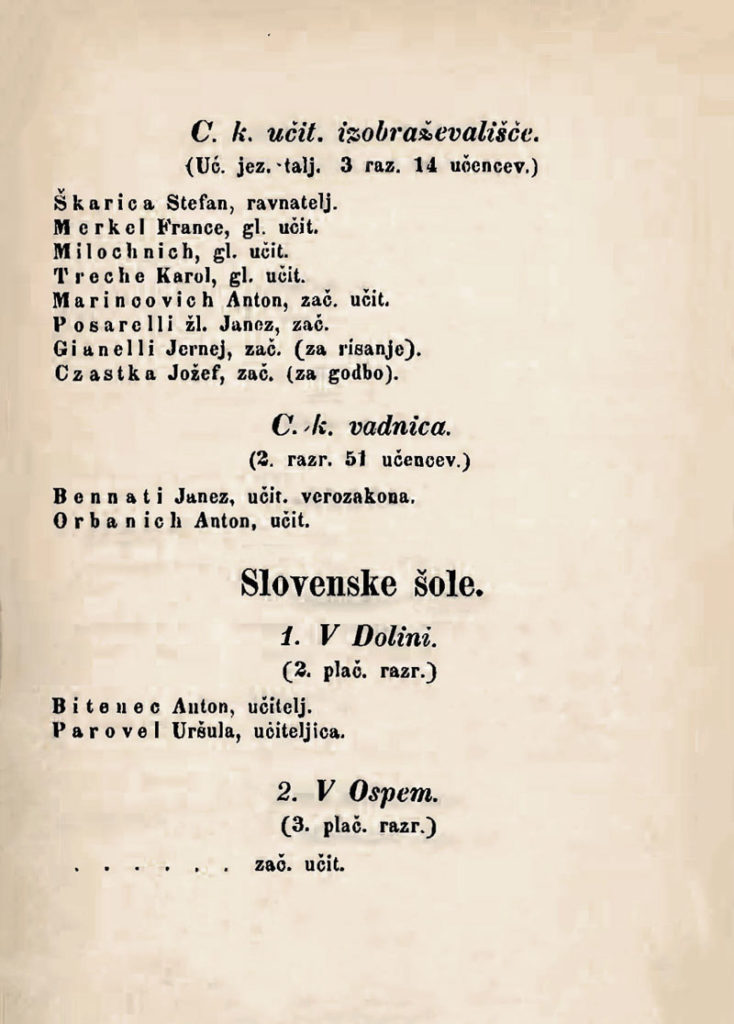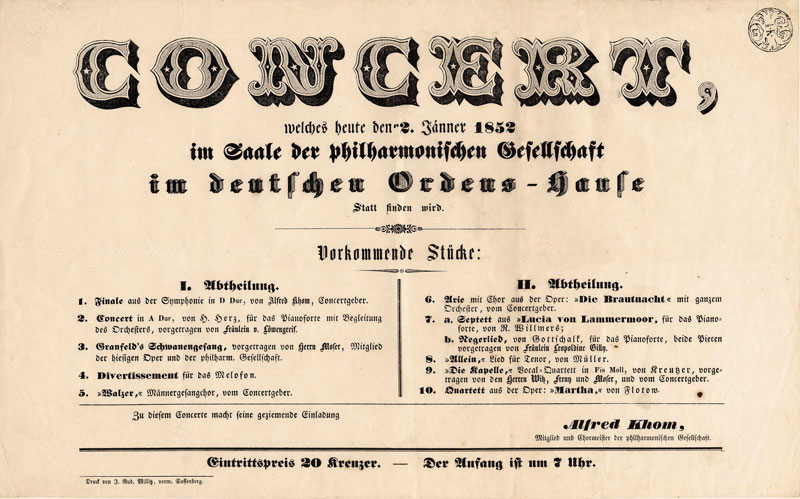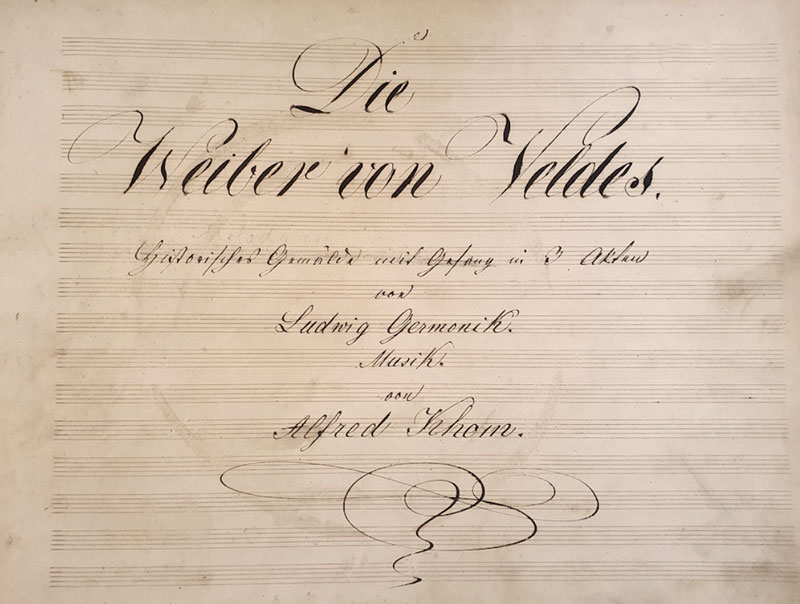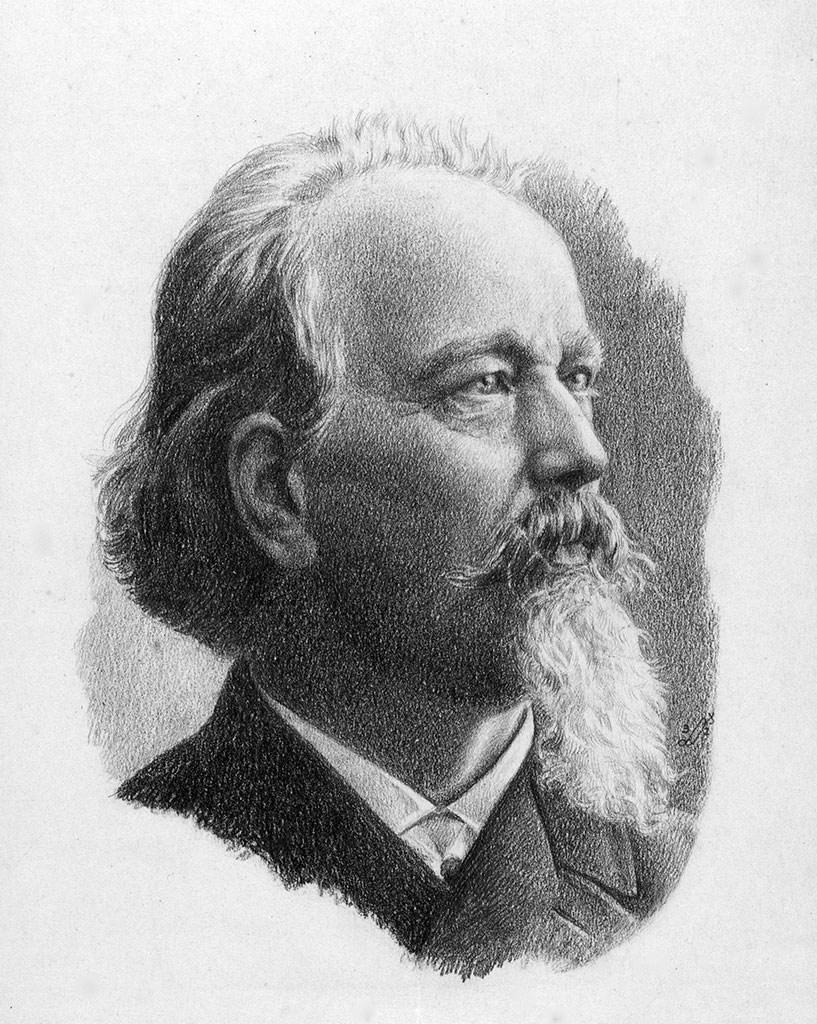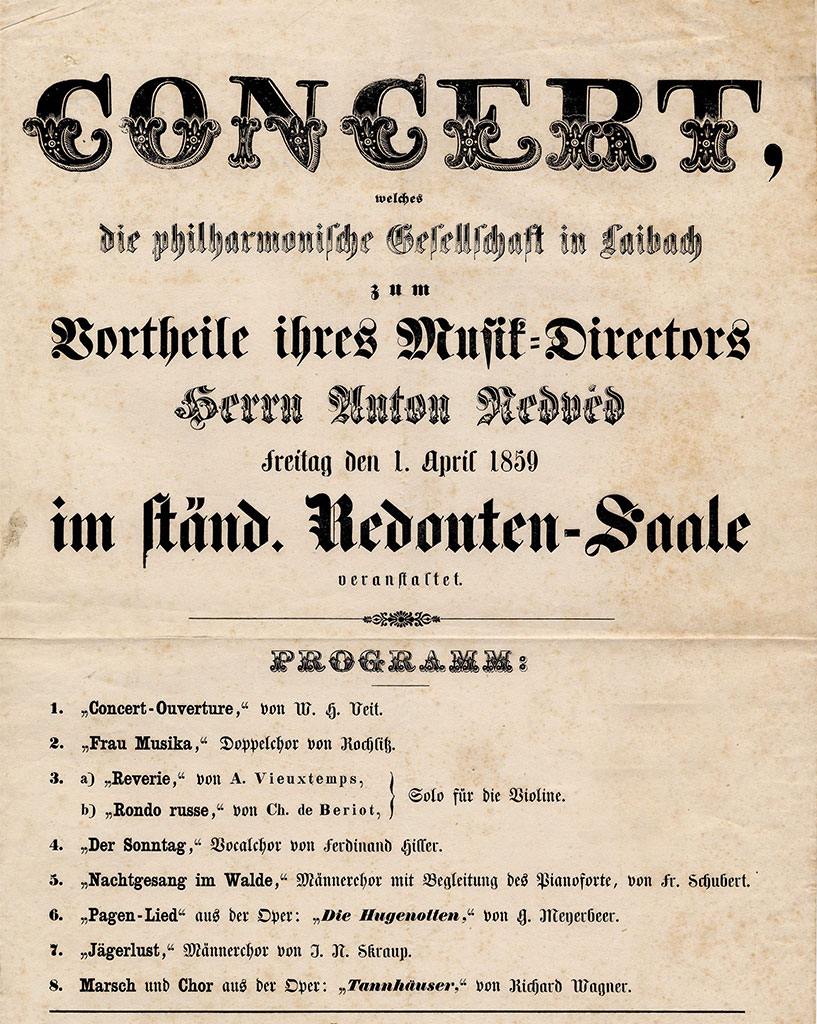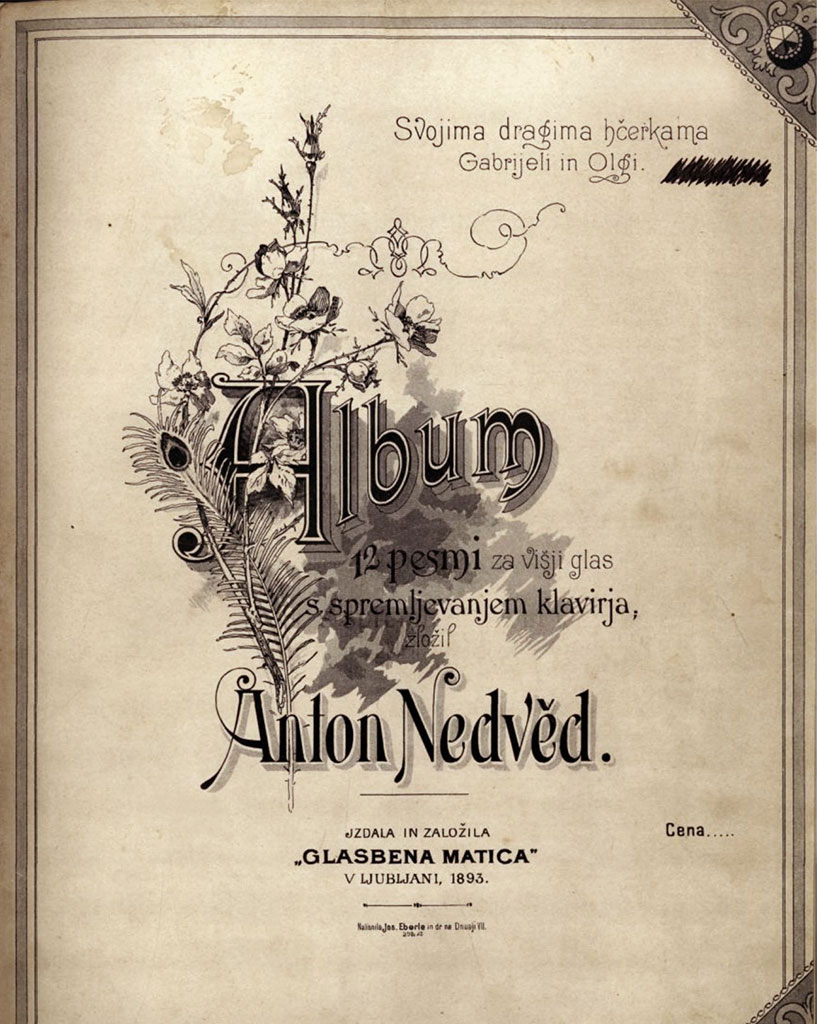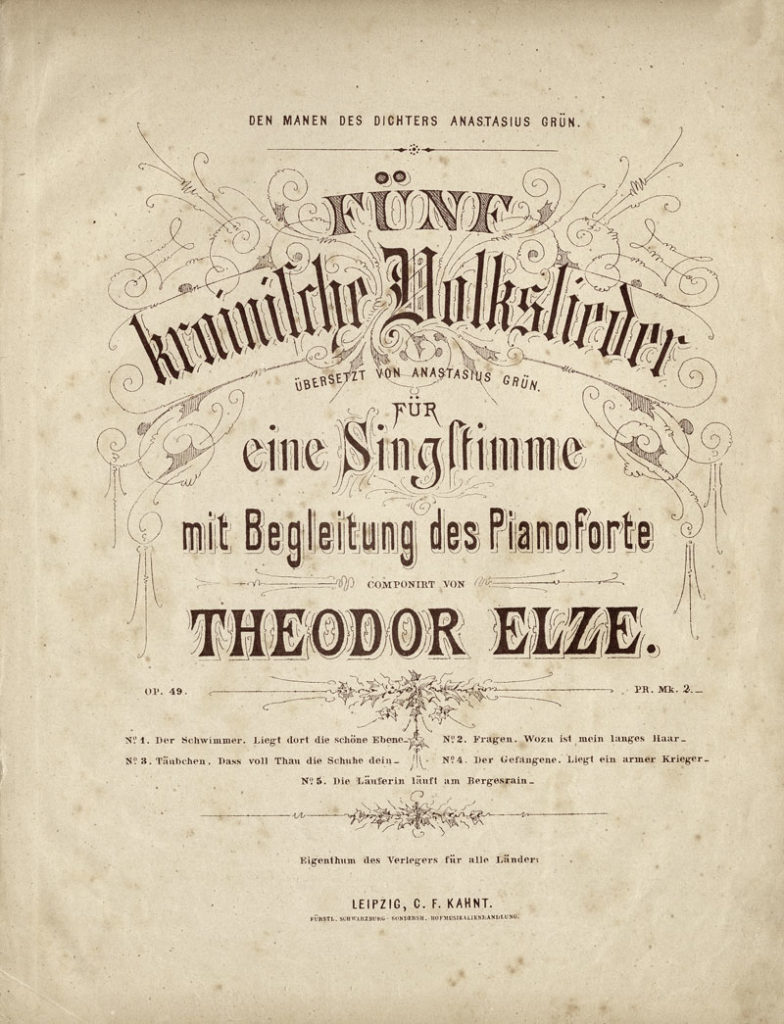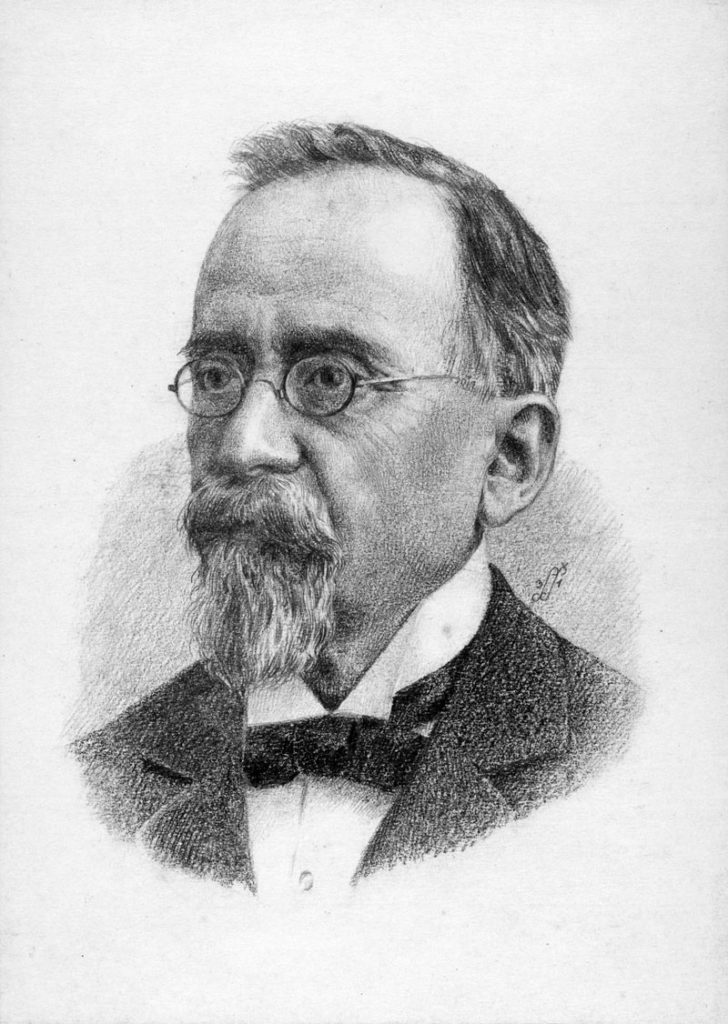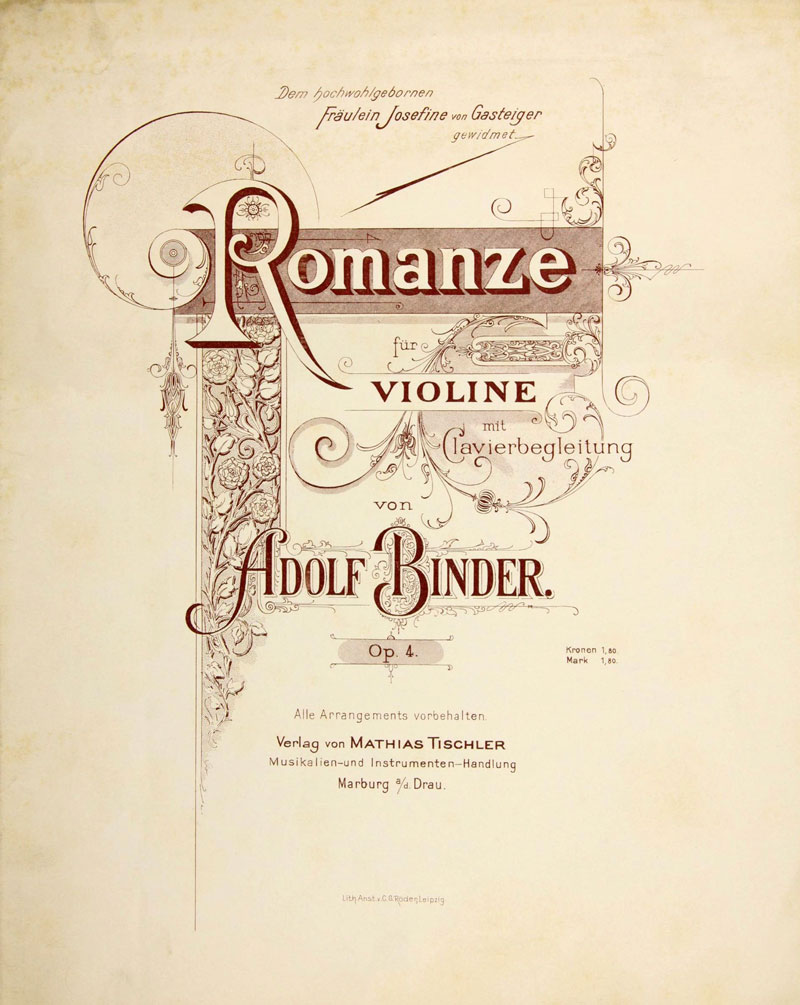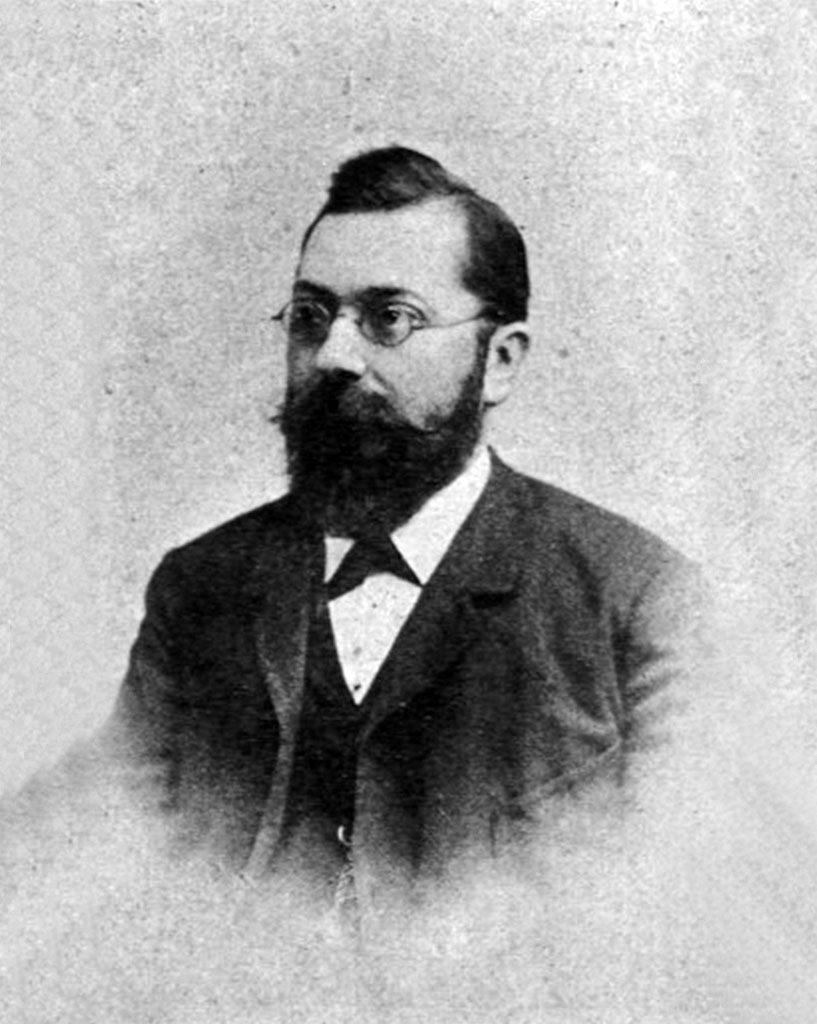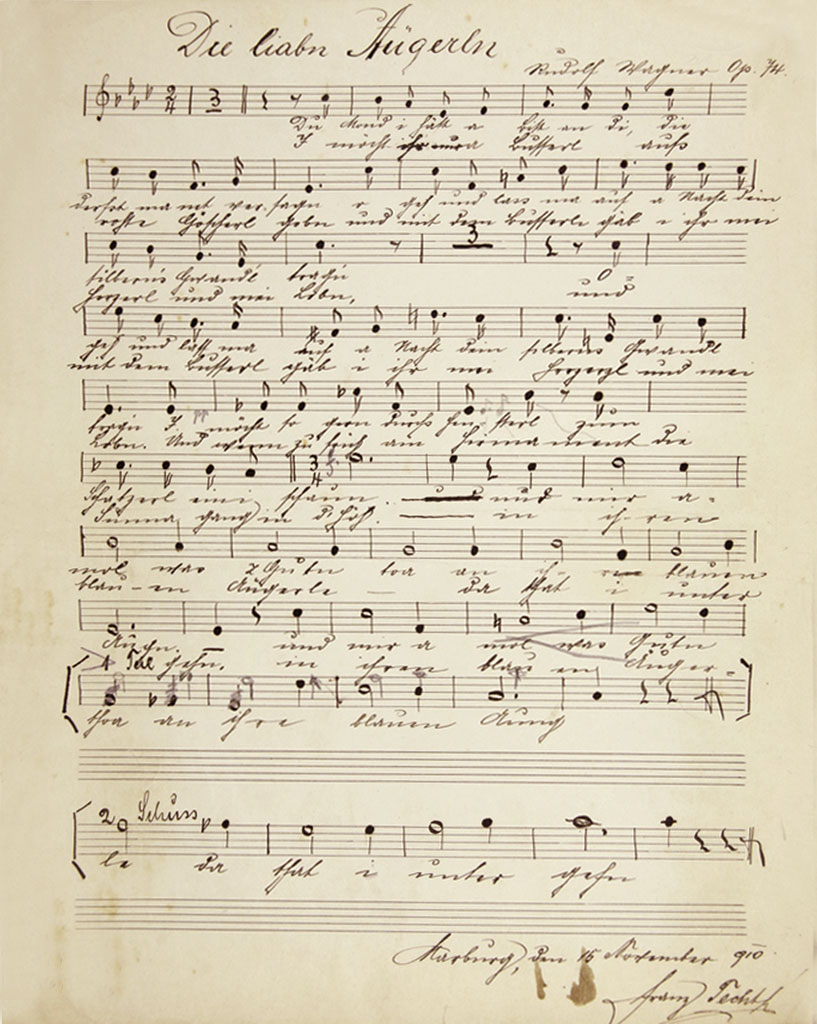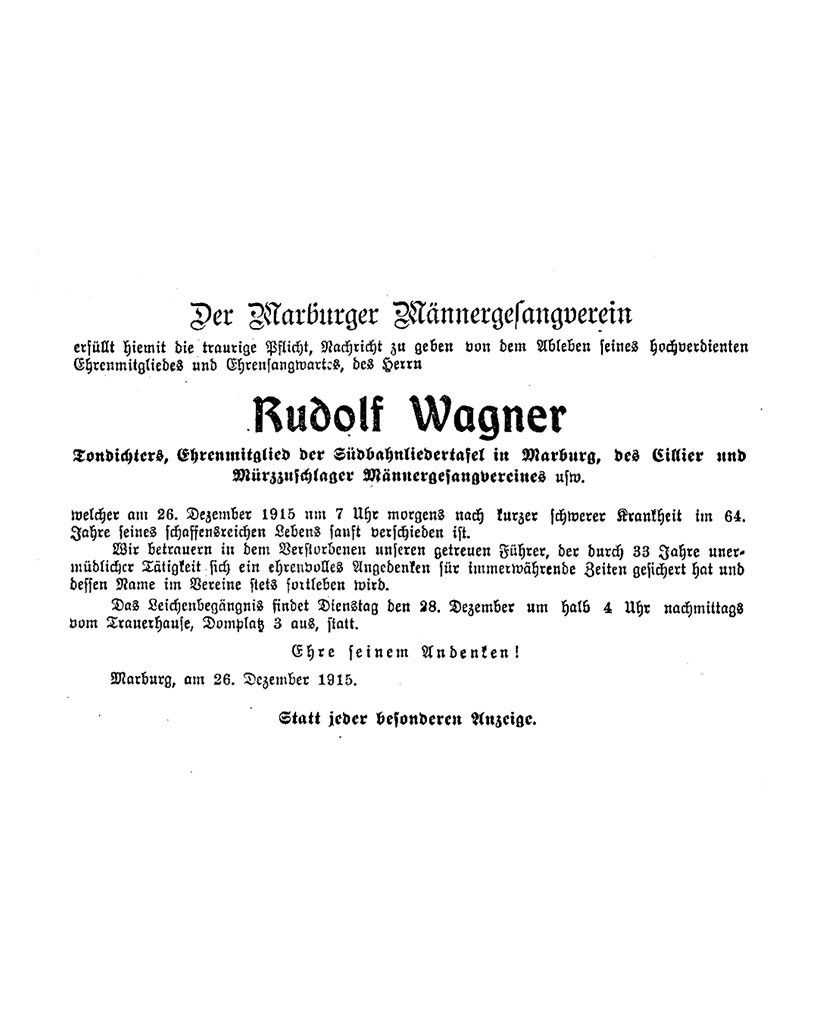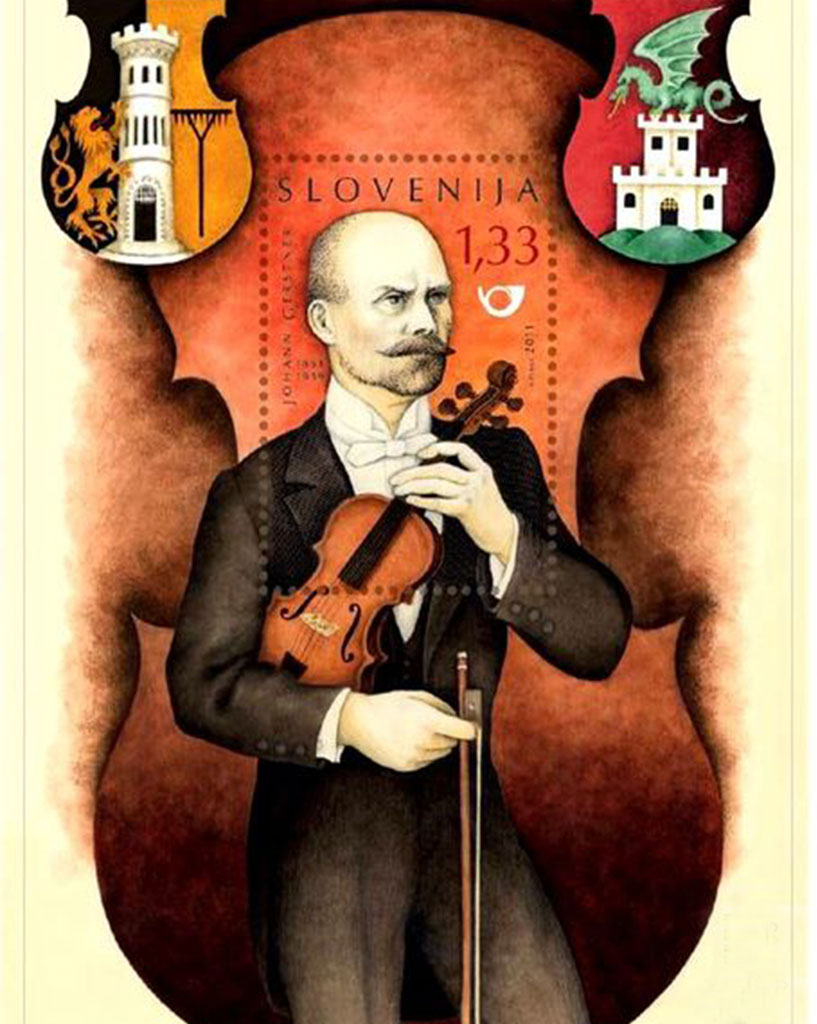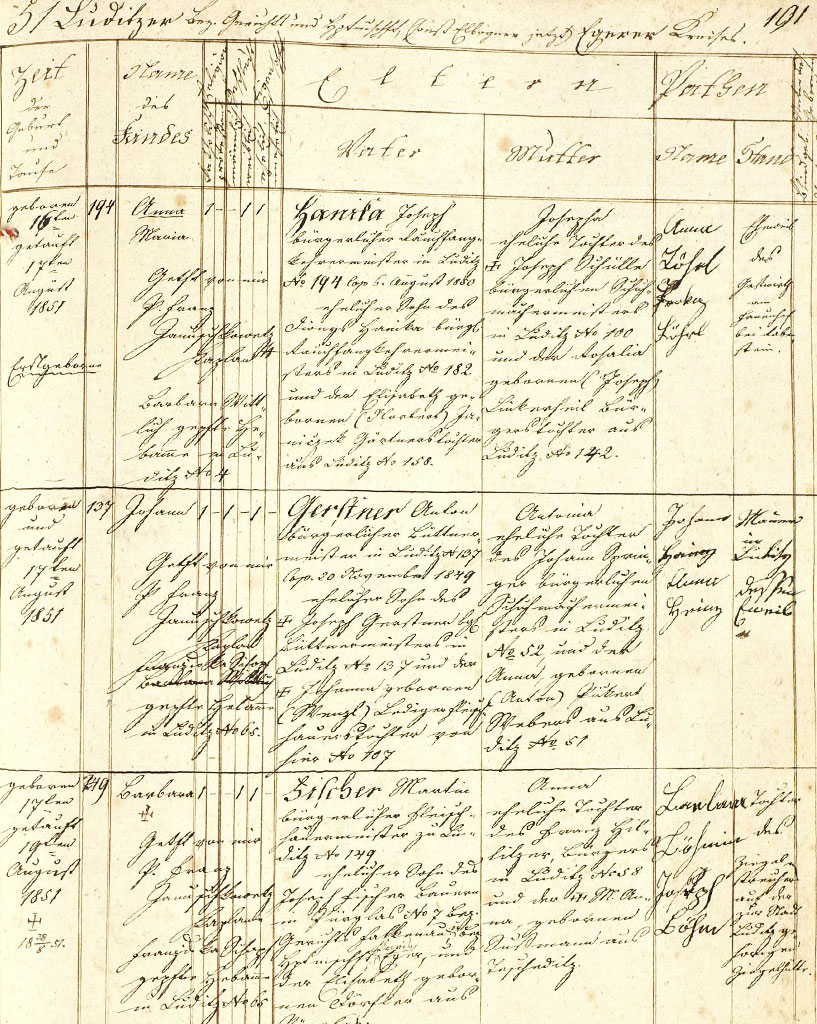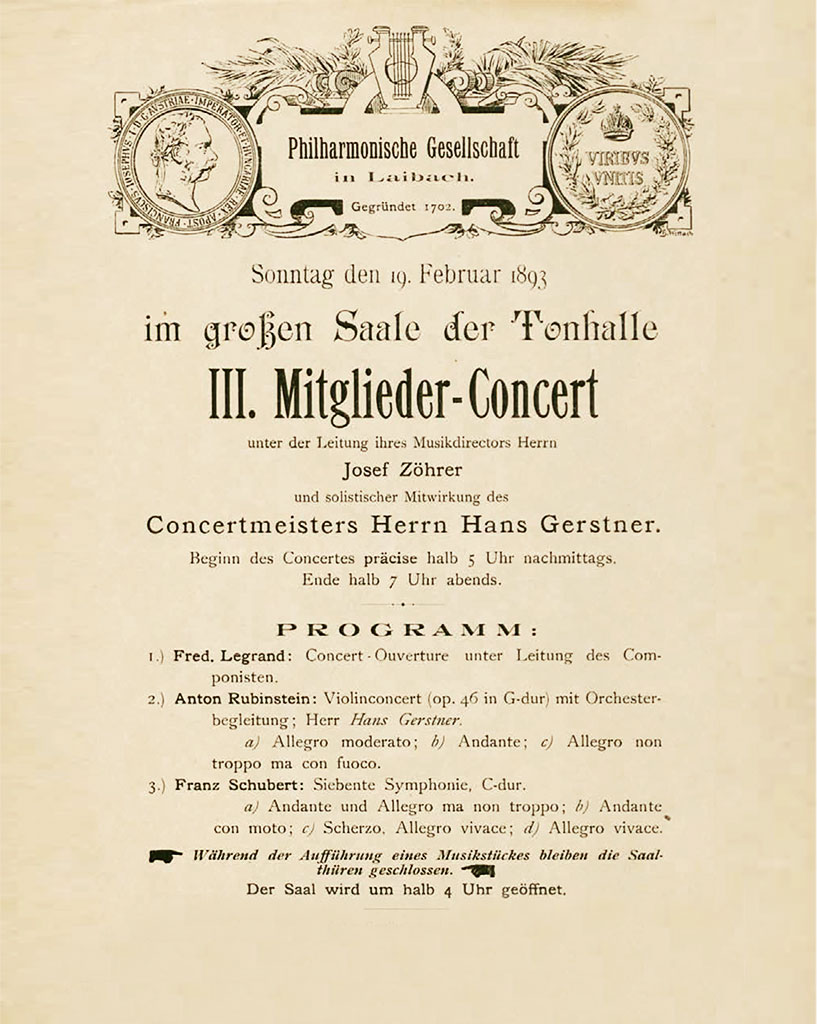VIRTUAL EXHIBITION
Join us on a journey of discovery, explore the musical heritage and experience the interconnected cultural roots of Europe.
Portraits
VI. THE IMMIGRANT MUSICIANS
During this golden period of music and migration, the paths of many musicians crossed in the Slovenian lands. They brought their musical knowledge and experience, music scores, the latest trends in performance styles and personal relationships with renowned musicians and patrons to our land, thus writing an important part of Slovenian music history and bringing forth a new generation of artists. Sometimes matters of the heart and resulting marriages convinced musicians to start a new chapter in their lives and settle in the often musically still quite dormant Slovenian lands.
Organist, Regens chori, Copyist and Composer
PEREGRIN MANICH
Peregrin Manich (1812–1897) was born in Úpice, Bohemia. He was educated as a teacher in Hradec Králove. He then worked as a teacher in Bohemia, then for several years as a teacher and monastery organist in Admont, Austria, and as a cathedral organist in Sankt Andrä. From 1847 he worked with Bishop Anton Slomšek (1800–1862), acting as a music advisor. When the seat of the diocese was transferred, he moved with Slomšel to Maribor, where he worked in the cathedral as organist and choirmaster until 1892. He also worked in the Maribor Philharmonic Society (Marburger Philharmonischer Verein), at the the School Sisters Institute (Zavod šolskih sester), taught instrumental subjects as an assistant teacher, and for a time directed the Reading Society choir. He composed ecclesiastical and secular works, most of which have been lost. He wrote an organ part as an appendix to Slomšek’s theological poems Drobtinice (1861). He also worked as a copyist and is the author of about eighty-five manuscript copies preserved in the Maribor Cathedral.
Violinist and Composer
JOSEF CZASTKA
Josef Czastka (Giuseppe Czastka; 1818–1884) was born in Brno, Moravia. After fifteen years of military service, he came to Primorska, where he was bandmaster of the military band for five years. In the early 1860s he became a music teacher in Poreč. From 1865 to 1874 he worked as conductor and music teacher of the Philharmonic Society in Koper. According to the society’s regulations, in addition to teaching at the local music school, he had to conduct the orchestra, the choir, and the municipal brass band. At the same time, the teacher was also responsible for accompanying festive church services on the organ in the Koper Cathedral. During his two years of activity there, he built up a forty-member brass band, as well as a thirty-member orchestra and choir. From 1874 to 1883, with an interruption in the 1877/78 school year, he taught voice and violin as a teacher in all departments of the Koper Teacher Training College, and from 1876 at the secondary school in Koper. His teaching at the Teacher Training College was of great importance, because he trained a number of later important musicians, including Hrabroslav Volaric. He also performed as a violinist, for example at a school concert of the secondary school in Koper (1880), where he played the Fantasia by Charles Auguste de Bériot and conducted his own work, Coro di student. His composition Il Sestetto di Perugia had already been performed at an earlier concert (1876).
Kapellmeister and Composer
HEINRICH WEIDT
Heinrich Wilhelm Weidt (1824–1901) was born in Coburg. He received his music education from Heinrich Panofka and Jan Křtitl Pišek. In 1845/46 he was a music teacher in Wertheim, then lived in Hamburg, where he performed first as an actor, then as a singer and composer. He worked in at least twenty-four places in Europe as an actor, singer, bandmaster, choirmaster, composer, or pedagogue. Weidt moved to Celje in 1887 and became artistic director and director of the Celje Music Society (Cillier Musikverein). He taught piano, theory, and strings at the school and also gave private lessons in voice, piano, violin, and harmony. In 1888 he took over the direction of the chapel. Due to disagreements with the association, Weidt left Celje in 1890. In Celje, he wrote several works that were performed on the Celje Music Society stage. Among them was the work Die Bergkraxler von Cilli. Marsch zur Erinnerung an die Regional-Ausstellung in Cilli 1888, op. 144. From Celje he moved to Banat in 1893, where he worked in various places as a choirmaster, music director, and piano teacher. In 1899 he settled in Graz, where he died in 1901.
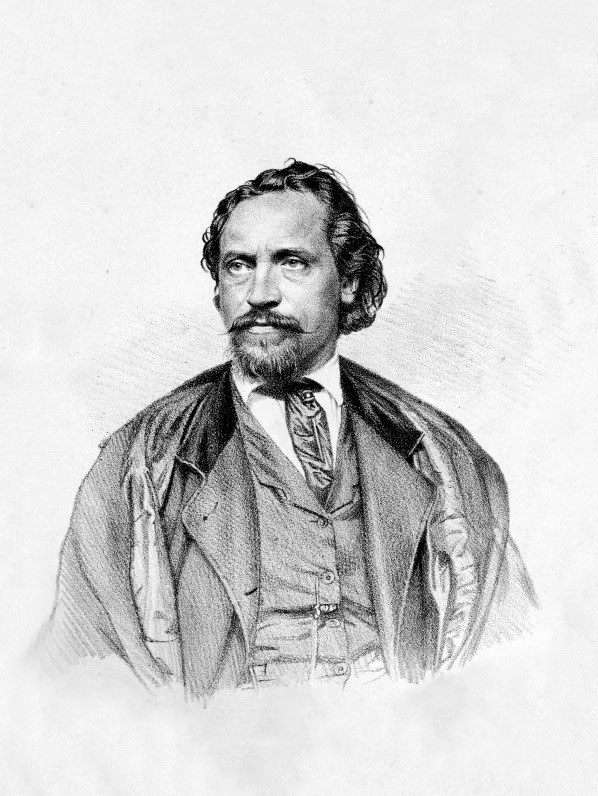
Pianist, Choirmaster and Composer
ALFRED KHOM
Alfred Khom (1825–1893) was born in Linz and studied at the Vienna Conservatory. He interrupted his studies to become the orchestra conductor (Theaterkapellmeister) at the theater in Klagenfurt. At the same time he took over the local Men’s Choral Society (Männergesangverein). During the 1848 revolution, he went to Ljubljana, where he accepted the position of singing teacher and leader of the Philharmonic Society’s men’s chooir. In addition, he offered private lessons in piano, singing, physharmonica, figured bass, harmony, and composition. He regularly participated as a performer and composer in Philharmonic Society concerts. He performed symphonic and chamber works, choral and sacred compositions, and numerous arrangements of works by other composers. He was the first person to perform works of J. S. Bach (in his own arrangements) in Ljubljana. He was also an organist at one of the Ljubljana’s churches, and for a longish period a singing teacher at the Catholic Journeymen’s Association (Katholischer Gesellenverein). In the late 1850s he started work as as an assistant music teacher at the public music school. He later supplemented his music with arrangements of folk tunes. In 1861 he moved to Graz and died in 1893 in Simmering near Vienna. Discover more
Choirmaster, Conductor and Composer
ANTON NEDVĚD
Anton Nedved (1828–1896) was born in Hořovice in Bohemia, where he received his first music lessons. He then studied privately in Prague with professors from the Prague Conservatory (e.g., Moritz Mildner), but he was never officially enrolled. For a short time he worked at the opera house in Brno. In 1856 he applied for the vacant position of voice and violin teacher at the Philharmonic Society (Philharmonische Gesellschaft) in Ljubljana, where he remained until his death in 1896. He was director of the Philharmonic Society and a teacher there for four years, but devoted himself mainly to the society’s performances and artistic activities. He performed in more than 180 concerts, mainly as a conductor. He revived the men’s choir, with which he performed as a soloist, founded the women’s choir, and acted as conductor of the orchestra. With his repertoire he overcame provincialism and promoted Slavic and Slovenian compositions. In 1861 he introduced regular chamber concerts. He was a versatile pedagogue and worked at the public music school, the secondary school, the seminary, and the teachers’ college. His didactic manual “A Short Lesson on Music” (Kratek nauk o glasbi; 1863), based on systematic music teaching, is the first work of Slovenian music education. Among the highlights of his didactic work are the manuals “Singing Lessons for Beginners for Primary Schools” (Početni nauk o petji za ljudske šole; 1894) and “Singing Exercises” (Vaje v petju; 1894). For twenty years he devoted himself to songbooks and collections of school songs and published a number of useful volumes. More than two hundred of his compositions, mostly vocal works (choruses and songs), are preserved in Ljubljana. He was the most performed local composer in Slovenia. More than 150 of his works were performed in more than fifty concerts in Ljubljana alone. His works were also performed in reading societies all over Slovenia, by the Music Society and its branches, and many other societies.
Violinist and Composer
THEODOR ELZE
Theodor Clemens Elze (1830–1895) was born in Oranienbaum in Germany and received his first violin and piano lessons from his father. He then continued his studies at the Leipzig Conservatory, where he studied piano with Bohemian composer and piano virtuoso Ignaz Moscheles (1794–1870) and Louis Plaidy (1810–1874), violin with Ferdinand David (1810–1873) and Prague violinist Raimund Dreyschock (1824–1869), and composition with Moritz Hauptmann (1792–1868). In 1852, at the age of twenty-two, he moved to Ljubljana, probably at the invitation of his cousin Theodor Ludwig Elze (1823–1900), pastor of Ljubljana’s Lutheran Church from 1851. He contributed to Ljubljana musical life for over forty years as an organist at the Lutheran Church, music teacher, and composer until his death in 1895. He wrote symphonies, string quartets, violin sonatas, and vocal and vocal instrumental works. At least twelve of his compositions, mainly vocal, were performed on the Philharmonic Society stage.
Organist, Choirmaster and Composer
ANTON FOERSTER
Anton Foerster (1837–1926) was born in Osenice, Bohemia. He first studied music with his father, then entered a Cistercian monastery and completed his law studies in Prague. There he met Bedřich Smetana, among others, and then devoted himself exclusively to music. In 1865 he became cathedral organist and choirmaster in Senj, and two years later he moved to Ljubljana, where he first worked as music director of the Drama Society (Dramatično društvo) and as choirmaster of the National Reading Society. From 1868 he directed the music at Ljubljana Cathedral, where he introduced true liturgical singing and reorganized church music according to church regulations (the Cecilia movement). In his younger years he also performed as a pianist and was the best organ virtuoso of his time in Slovenia. He founded the organ school of the Cecilia Society (Cecilijino društvo), which he directed from 1877 to 1908 and where more than 150 organists were trained. He was the editor of the journal Cerkveni glasbenik (Church Music). He also taught at other institutions in Ljubljana. He wrote numerous ecclesiastical and secular works and authored several theoretical works: Singing School (Pevska šola; 1874, 1880, 1888, 1895 and 1901), Harmony and Counterpoint Lessons (Nauk o harmoniji in kontrapunktu; 1881 and 1904), and Theoretical and Practical Piano School (Teoretično praktična klavirska šola). Discover more
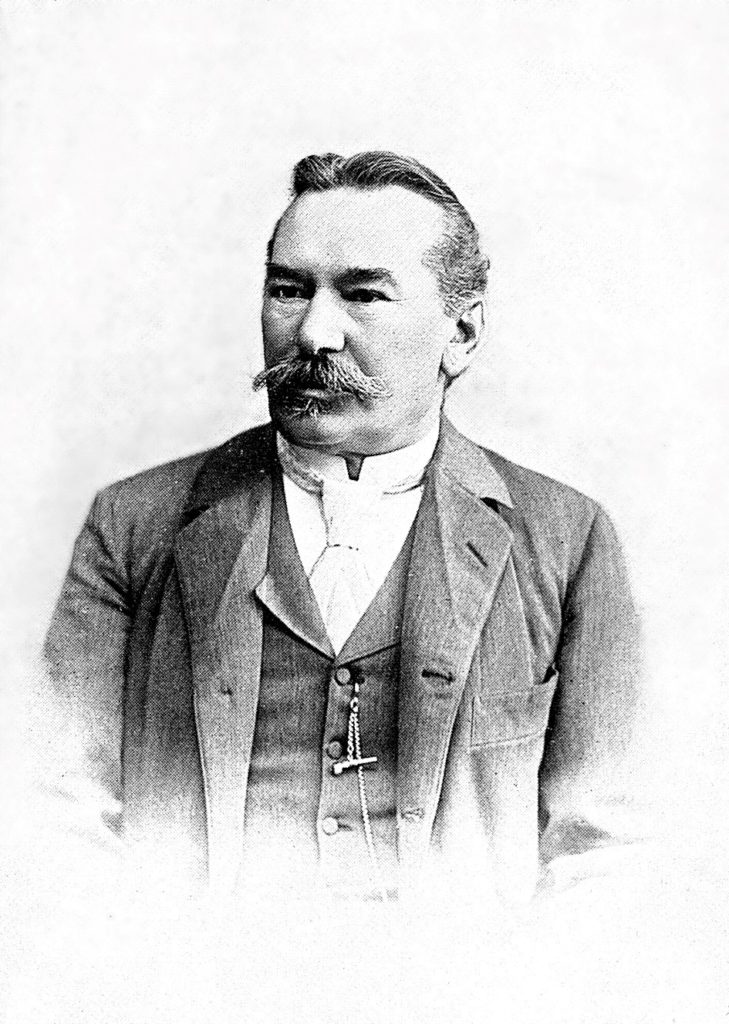
Pianist, Conductor and Composer
JOSEF ZÖHRER
Josef Zöhrer (1841–1916) was born in Vienna, where he studied piano and composition. He gave his first concert in Ljubljana on 14 November 1862, after which he was a theater conductor in Trieste. In the autumn of 1865 he became a piano teacher at the music school of the Philharmonic Society of Ljubljana (he also taught cello, singing, and harmony), and at the same time took over the direction of the choir. In Ljubljana he made a particularly important contribution as a pianist and conductor at more than 350 concerts of the Philharmonic Society (about 160 as a performer and about 190 as a conductor). As a soloist, he distinguished himself primarily by performing demanding piano concertos by renowned composers, and he also appeared regularly in chamber music ensembles. Zöhrer only exceptionally appeared as a soloist without an orchestra, and only in concerts of mixed repertoire, not in solo recitals. He made his first appearance as a conductor in Ljubljana in 1868, when he replaced the ailing Anton Nedved. In 1883 he took up the post of music director of the Philharmonic Society. He regularly conducted symphonic, choral, and vocal-instrumental concerts. Discover more
Violinist and Composer
ADOLF BINDER
Adolf Binder (1845–1901) was born in Buškovice, Bohemia. He completed his primary education in Litoměřice and trained as a teacher. From 1866 to 1867 he attended the organ school in Prague. He learned to play the violin and trained in music theory and composition. After graduation, he went into the theater and toured with acting troupes in southeastern Europe as far as Istanbul. For a time he worked at the theater in Osijek and taught music to the noble families there. He settled in Helenental near Baden, Austria, as organist and choirmaster. In the fall of 1884 he moved to Maribor and began working at the Philharmonic Society music school, where he remained until 1901. He was a prolific composer. His works include symphonies, overtures, numerous chamber works, and other sacred and secular works. Many of his works were printed and performed in Maribor, Ljubljana, and Salzburg, and throughout Germany and Switzerland.
Violinist and Composer
OSKAR RIEDING
Oskar Friedrich Rieding (1846–1916) was born in Prussian town of Bahn (now Banie, Poland), where his father Gottfried Friedrich Rieding was a town doctor. It remains unknown where he acquired his first music training, but some sources suggest that he studied violin, piano, and composition at the Neue Akademie der Tonkunst in Berlin in the late 1850s, where his violin teacher was Adolf Grünwald. He then continued his music studies at the Leipzig Conservatory between 1862 and 1864 in the class of the Prague violinist Raimund Dreyschock, who was the second concertmaster of the Leipzig Gewandhaus Orchestra. After his studies, Rieding visited Vienna and Munich, but we have no detailed information about this period, and sources indicate he was also a member of the theater orchestra in Baden near Vienna. He first appeared in Slovenia in 1870 in Ljubljana where he gave two performances on the stage of the Estates Theater and the Philharmonic Society and one more in 1871. In the same year Rieding moved to Pest (part of today’s Budapest), where he spent thirty-two years as first violinist of the National Theater Orchestra (which later became the Royal Opera Orchestra). There he wrote his first instructive violin pieces, which were followed by his now-famous series of “easy” concertos and concertinos for violin and piano. Following his retirement in 1903 Rieding moved to Celje, where he continued working as composer and private violin teacher, and participated in concerts at the local Lutheran Church. Most of his famous works were written in Celje and were already performed as part of school performances of the Celje Music Society (Cillier Musikverein). In addition to the Celje Music Society, the Celje Lutheran Church concerts also featured some of Rieding’s now completely unknown works, such as compositions for violin and organ and the Hungarian Rhapsody for violin and orchestra. Before the First World War he wrote four concert miniatures: “Tenderness,” “Confession,” “Departure,” and “Desire,” the last of which Rieding dedicated to his Celje pupil Elisabeth Matič. He died in 1916 in Celje. Discover more.
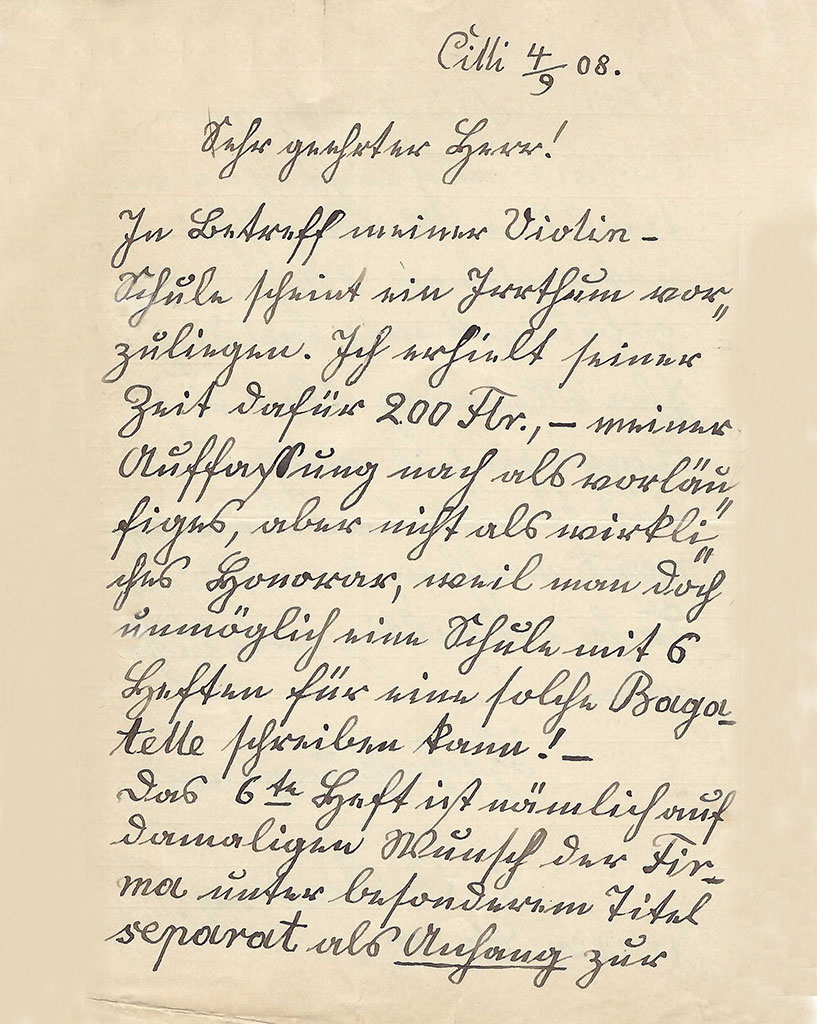
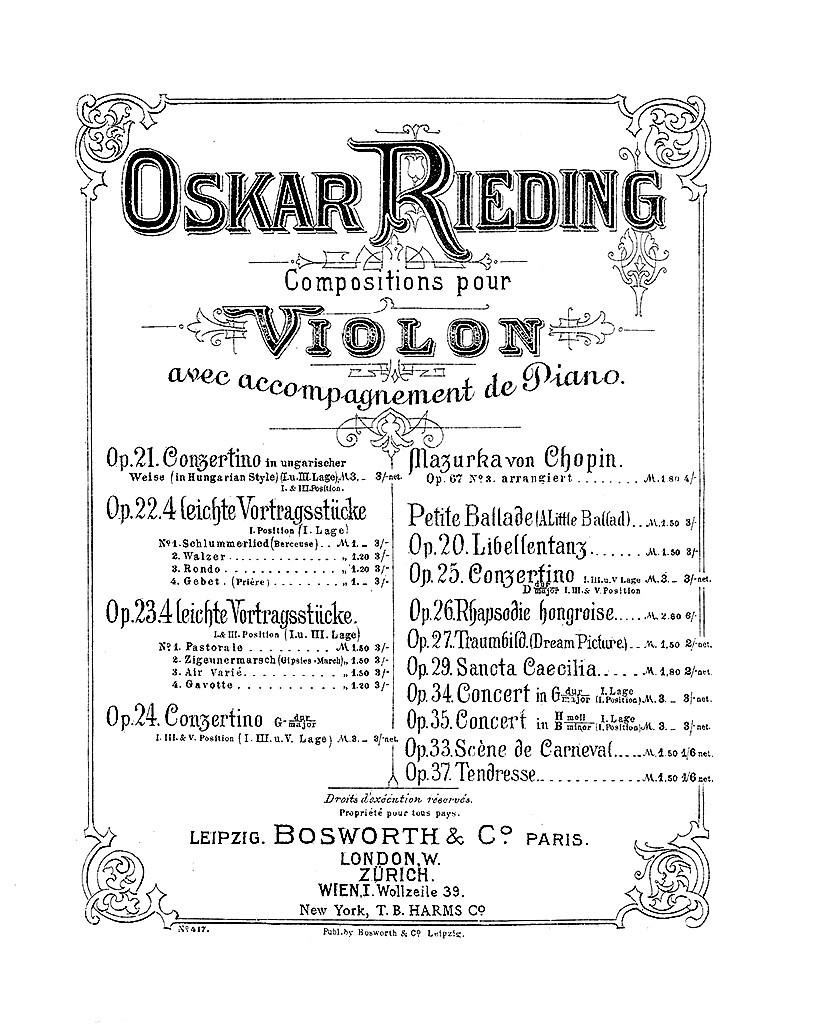
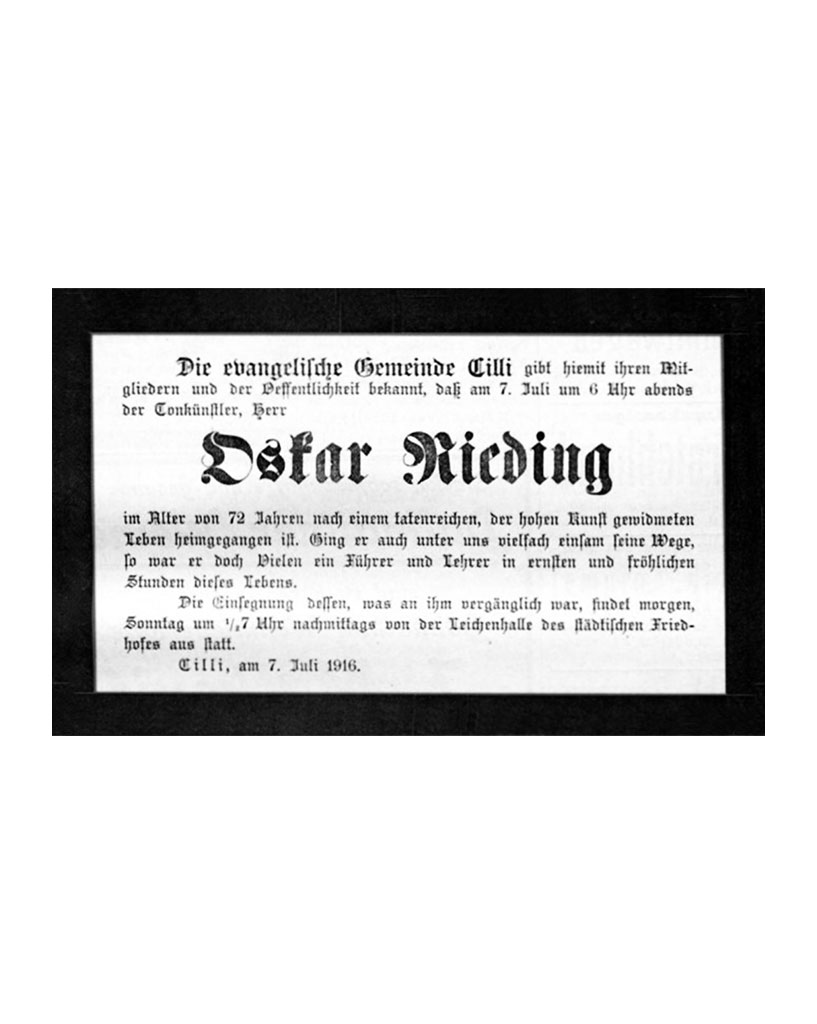
Flutist and Composer
GUSTAV WAGNER
Rudolf Wagner (1851–1915) was born in Vienna to factory owner Johann Wagner. He attended primary school in Vienna and enrolled at the Konservatorium der Gesellschaft der Musikfreunde, where he studied flute, counterpoint, and composition (1863–1869). From 1870 to 1873 he served in the army with a military band and excelled in playing the flute, performing as a solo flautist with the Burgtheater orchestra (1874). He toured a dozen cities of the empire, including Budapest, Olomouc, Sibiu (Romania), Arad (Romania), Jihlava (Bohemia), Bucharest (Romania), and Bolzano (Italy). Wagner then served as a military chaplain in Trento (Italy), Mostar (BiH), Pljevlja (Montenegro), and Trieste (Italy). Those hectic years ended in 1881 in Maribor, where he became the conductor of the theatre orchestra and was also permanently employed as an organist at the city’s cathedral and as an assistant music teacher at the college for male teachers (1883−1885). After passing the examination for giving music lessons at secondary schools (Vienna, 1895), Wagner taught at the Maribor Classical Secondary School from 1896 until his death. He was also the choirmaster of the Men’s Chorus. His oeuvre is quite extensive, numbering around three hundred works. Apart from a small number of printed works published by various German publishing houses in Vienna, Graz, and Leipzig, most of his compositions are preserved in unpublished manuscripts. A cursory glance at the composer’s oeuvre reveals a bias towards lighter genres that were less demanding in terms of composition, execution, and reception. These include are numerous works for wind band (overtures, marches, dances), three operettas (Marietta, Das Blümchen Wunderhold, and Bramabarsetto) and many choruses with or without accompaniment written for various occasions. Wagner probably produced his most important works in the domain of church music: notably masses, organ works, and choral pieces. It is much less well known that he created most of his compositional oeuvre in Maribor.
Violinist, Concertmaster and Teacher
HANS GERSTNER
Hans Gerstner (1851–1939) was born in Žlutice in Bohemia. He studied violin at the Prague Conservatory with Moritz Mildner and Antonín Bennewitz between 1864 and 1870. In 1870 he was a member of the German Theater Orchestra and the Bennewitz String Quartet in Prague. In 1871 he moved to Ljubljana, where he became orchestra director of the Provincial Theater Orchestra and rose to become one of the most important musicians of the Philharmonic Society in Ljubljana. During his career of more than forty years as concertmaster of the Philharmonic Society, soloist and conductor of the Philharmonic in chamber concerts and at various charity events, Gerstner performed in nearly six hundred concerts. As a soloist and chamber musician, he participated in more than two hundred society concerts. During his long career as a violin teacher at the Philharmonic Society, he taught numerous brilliant violinists who later worked in Slovenia and abroad. He performed violin concertos by Bazzini, Mendelssohn, Spohr, Bruch, Beethoven, Beriot, and Lipinski in Ljubljana. With his most prominent students, Gerstner premiered numerous violin compositions and raised violin playing to a whole new level. He played the violin sonata by César Franck (1902) for the first time in Ljubljana, as well as the violin concerto in E major by J. S. Bach (1904), and the violin sonata op. 45 by Edvard Grieg (1908). During his life he established contacts with famous musicians (Smetana, Dvořák, Rosé, Laub, Brahms, Mahler, Strauss, etc.).

